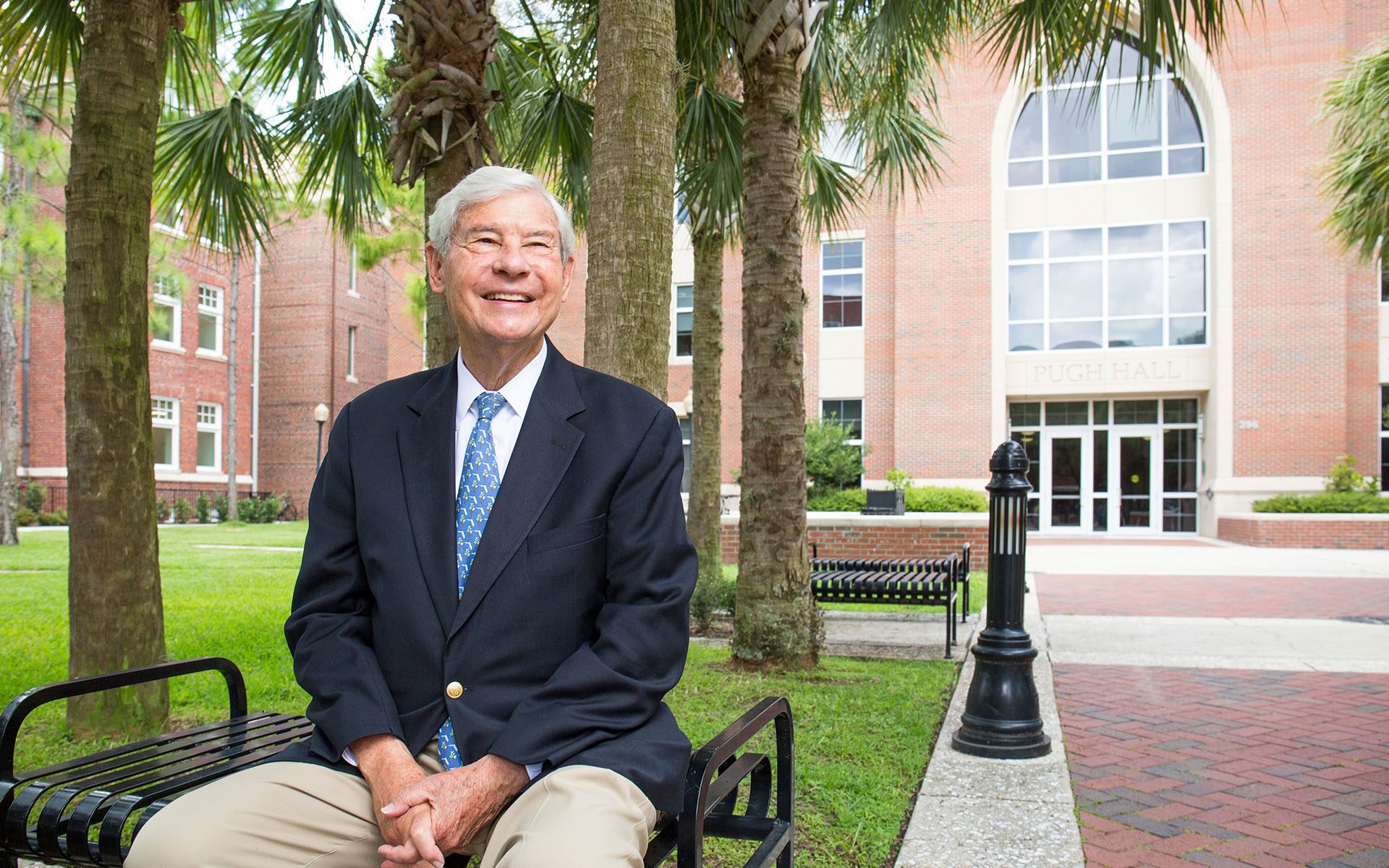On a crisp November day in 2003, Bob Graham ’59 stood on what remained of Lincoln High School’s track in Tallahassee, Fla., telling supporters and TV cameras that after almost 40 years in elected office — first as a state legislator, then as a two-term Florida governor, and finally as a three-term U.S. senator — he would not be seeking re-election to a fourth term in Congress. In his speech, Graham spoke of his intention to remain active in public life and his desire to create a nonpartisan policy institute that would focus on preparing the next generation of citizen leaders.
“My decision should in no way be viewed as a statement that I have completed all that I want to accomplish,” he said on the dismantled track, which he had been refurbishing during one of his iconic workdays. “I intend to continue to make a difference, albeit in a different way after January 2005.”
David Hedge, a political science professor at the University of Florida, listened intently as Graham announced his retirement on C-SPAN. Hedge was intrigued. He knew that Graham’s UF roots ran deep. Graham graduated with high honors from the university with a degree in political science. He was a member of the Phi Kappa Phi honor society and, even more importantly, met his wife of nearly 60 years, Adele, on the steps of Tigert Hall.
“I immediately contacted the dean of the College of Liberal Arts and Sciences, then-Dean Neil Sullivan, about the possibility of creating a center at UF,” Hedge recalls. “This was something a number of us thought universities should be doing, particularly in terms of public leadership.”
Sullivan and then-UF Provost David Colburn subsequently met with Graham and pledged to commit the necessary administrative support and funds needed to bring Graham’s vision to fruition at UF. In summer 2005, Graham announced the creation of his namesake, the Bob Graham Center. UF made it official in 2006.
A Vision and Mission
Graham hoped to create a center that would encourage the active participation of citizens and increase understanding of democratic institutions. A Harvard University law graduate, Graham’s vision for the Bob Graham Center was shaped by the work of the John F. Kennedy School of Government at Harvard.
“After retiring from the Senate, I spent a year as a senior fellow at the Kennedy School,” Graham says. “Because of my experience there, and because there were quite a few centers that were already doing public policy well, I wanted to focus on what I thought was missing — centers dedicated to developing human potential for public and civic leadership.”
From the outset, the Graham Center’s mission was to provide students with the broad training necessary for careers in public leadership and to provide a forum for the public discussion of state, national, and global issues — a calling that remains central to the center’s programming today.
In its earliest days, the center established a public lecture series, for which it remains well known on campus, in the Gainesville community, and beyond. Two-time Pulitzer Prize winner David McCullough served as the center’s inaugural keynote speaker. Former President Jimmy Carter, former Supreme Court Justice Sandra Day O’Connor, former Secretary of State Madeline Albright, U.S. Rep. John Lewis, and journalist Nicholas Kristof are just a few of the other renowned guests that the center has hosted.
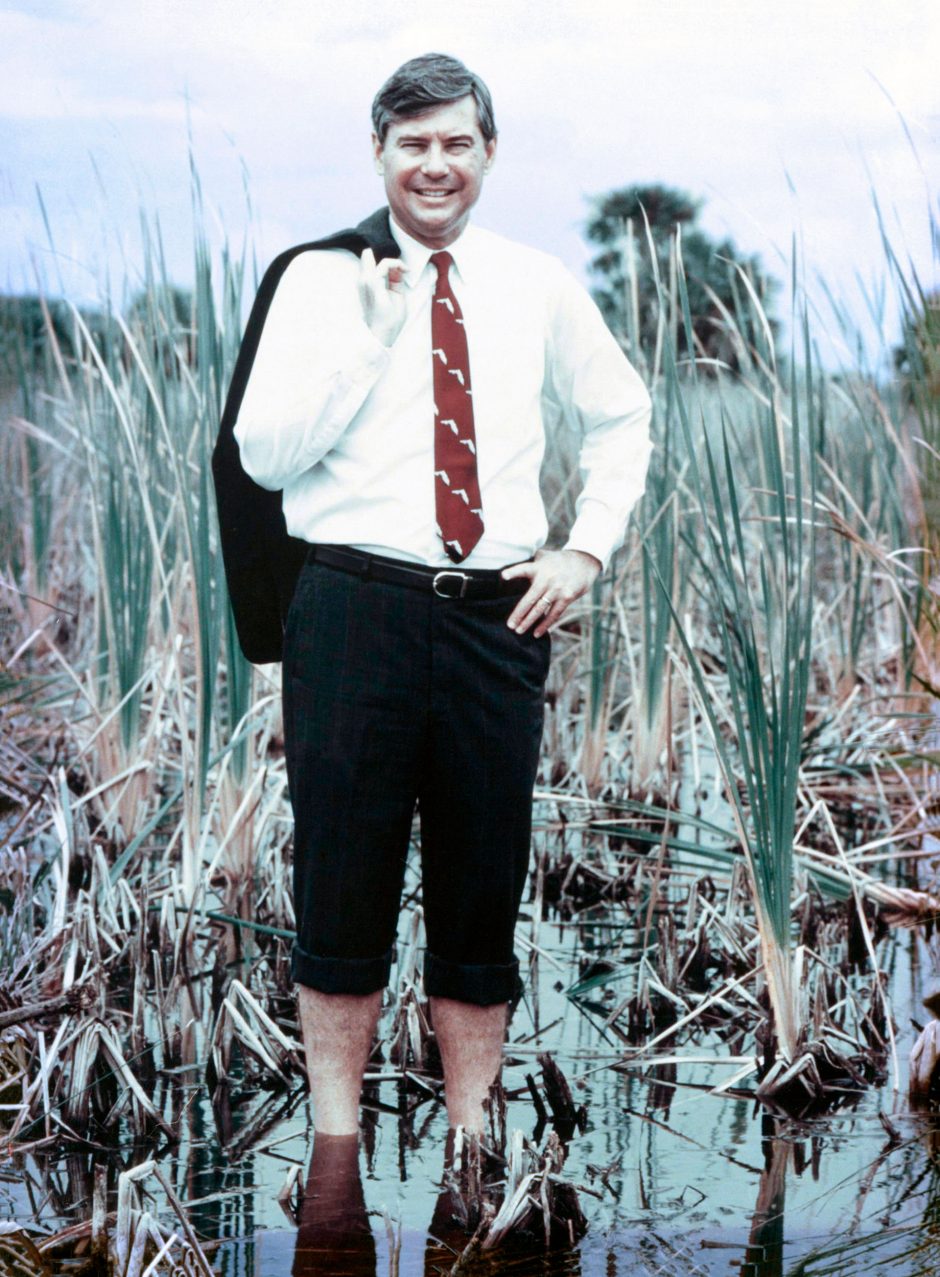 Gov. Bob Graham made a case for the Everglades — and the cover of Newsweek, ca. 1980. D. Robert “Bob” Graham Political Papers, University of Florida
Gov. Bob Graham made a case for the Everglades — and the cover of Newsweek, ca. 1980. D. Robert “Bob” Graham Political Papers, University of Florida“Persuading decision makers, building coalitions, and researching facts in order to support your position from a level of greater understanding are the skills that we are equipping students with.”
The undergraduate certificate program (now a minor in public leadership), the Tallahassee Internship Program, and the Policy Scholars Program (now the Askew Scholars) became the first few of many opportunities offered by the Graham Center to enhance the undergraduate academic experience by providing hands-on civic engagement.
Ann Henderson joined the center as director in July 2009. Henderson brought with her an extensive background in state, national, and international issue management and had overseen a number of nonprofit organizations before arriving on campus. Under her leadership, the center received a $3 million grant from the John S. and James L. Knight Foundation in fall 2010. The grant proved critical to the center’s development, funding numerous programs including the development of an online civics course and the Fellows-in-Residence program.
The fellows program brings state leaders to the university to share their expertise and experience with UF faculty and students. Fellows are individuals who have a record of professional distinction but have also been recognized for their civic leadership. Past fellows have included Martha Barnett JD’73, former president of the American Bar Association; Nancy Hardt, M.D., professor emerita, UF College of Medicine; Preston Haskell, founder of the Haskell Company; and Hyatt Brown ’59, former CEO of Brown & Brown Insurance and former Speaker of the Florida House.
Reflecting on his experience as a fellow-in-residence, Brown says he was most impressed by students’ eagerness and the diversity reflected in those he interacted with at the center.
“I learned a lot and had a lot of fun. Young people bring great energy and new ideas. They are enthusiastic because their outlook is toward a positive future,” he said. “We are bringing people together from different courses of life — places, cultures, backgrounds, ideological beliefs — everyone coming together to learn from one another. That in itself is a super contribution to their overall educational experience.”
Haskell too was impressed with his interactions with students, but what stood out to him was the great social benefit that the center provides in teaching students how to work cooperatively with others and encouraging interdisciplinary research.
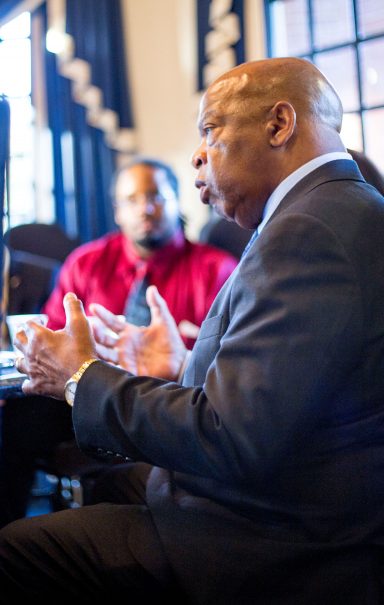
“It’s important to have the skills necessary to build consensus — to see the value in compromise, the ability to lead when necessary and to understand when it’s appropriate to let others lead,” he said. “Working collaboratively and having a broad base of knowledge across many disciplines is the key to success.”
Today, the fellow in-residence program continues thanks to the Knight Foundation’s generous support. Gainesville real estate developers and philanthropists Ken ’72, MBA’73, PhD’81 and Linda McGurn ’73, JD’78 will serve as joint fellows this spring.
Civic Engagement
Colburn, provost and senior vice president emeritus, took the helm of the center in 2012. With funding support from the College of Liberal Arts and Sciences and the Office of the Provost, Colburn added several programs to the already impressive catalogue of opportunities for students. The Graham Civic Scholars program, which commissions students to conduct county-level research on statewide issues; the Healthy Civic Campus and Community initiative, a social entrepreneurship grant program; and the Future of Florida Summit, a gathering of students from Florida’s colleges and universities to propose solutions to problems facing Florida, all have been established in the last five years.
“Active involvement is the only way to effectively master the skills needed to create change,” Graham says. “Persuading decision makers, building coalitions, and researching facts in order to support your position from a level of greater understanding are the skills that we are equipping students with.”
Of recent note is the center’s success in providing civic engagement opportunities through student internships. The center has placed more than 200 interns throughout Florida. Past internships have included positions with local and state government offices and agencies, the media, professional associations, and nonprofit organizations.
Last fall’s introduction of an innovative virtual internship program opened the door for UF students who previously were unable to take advantage of the traditional internship experience because of financial constraints. This program will serve as a vehicle for expanding internships significantly over the next few years.
The center’s newest internship venture is a partnership with the City of Gainesville that provides four fellowships each fall as part of the university wide town-and-gown effort. Fellows will work with the city manager’s office to provide a more citizen-centered approach to local government.
Centered on Students
Few roles the Graham Center and the university serve are as important as shaping and inspiring tomorrow’s leaders. “Every time I am at the center, I am impressed with the quality of students who have been drawn to the idea of active civic engagement,” Graham says. “They are smart, personable, and enthusiastic — exactly what our democracy needs for the next generation.”
Graham’s commitment to students is apparent to those who interact with him while he is on campus and is reflected in the center’s work.
“The center is a place you can tell he really cares about,” says Graham Center alumna Liana Guerra ’15. “He is always there — interacting with students, listening to them. He believed in me. He believes in students.”
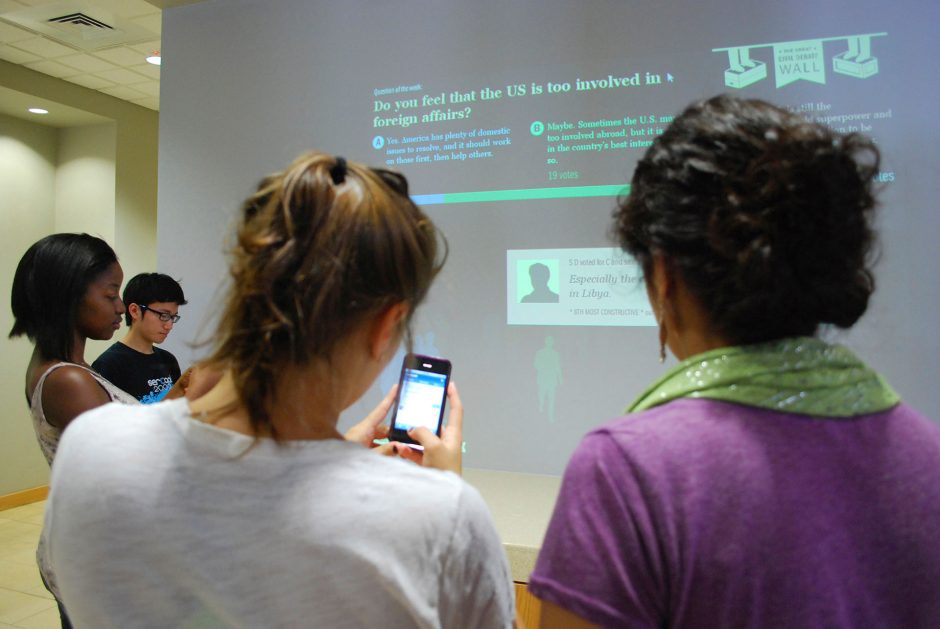
Before graduating from UF, Guerra, now the deputy chief of staff to U.S. Congressman Darren Soto, completed a Tallahassee internship through the center and was an Askew Scholar. The Askew Scholars program — named for former Gov. Reubin Askew who passed away in 2014— provides distinguished undergraduates the opportunity to develop their civic understanding and skills under the direction of a faculty mentor.
Guerra credits her public service trajectory to her involvement with the center. “Without the Bob Graham Center, I firmly believe I would not be where I am today,” she says. “The funding I was provided as an Askew Scholar allowed me to take an unpaid internship in Washington D.C., which led to my first job after graduation.”
As a Tallahassee intern in 2013, Guerra was placed in the office of then-state Sen. Darren Soto. Guerra kept in touch with Soto and his team throughout his 2016 congressional campaign, and when Soto won the Central Florida seat, he hired Guerra to serve on his team permanently.
“The center opened that door for me and will continue to do the same for other students,” Guerra adds.
A Home in Pugh Hall
Located in the heart of the UF campus in Pugh Hall, the Bob Graham Center stands at the cornerstone of the university’s academic, intellectual, and civic life. A $5 million gift from Jim Pugh ’63 and his wife, Alexis, made possible the construction of Pugh Hall in 2008. The couple later pledged an additional $1 million to name the building’s teaching auditorium in honor of another former Florida governor, Buddy Mackay JD’61 and his wife, Anne.
“Adele and I are grateful for Jim and Alexis’ gift, which made possible the building that the Graham Center calls home,” Graham says. “Their generosity has its signature in many places across our great state. They have done many fabulous philanthropic things together.”
Graham and Pugh met as Sigma Nu fraternity brothers at UF in the late 1950s and have remained friends since. The two maintained a shared love for UF and a commitment to education and public service.
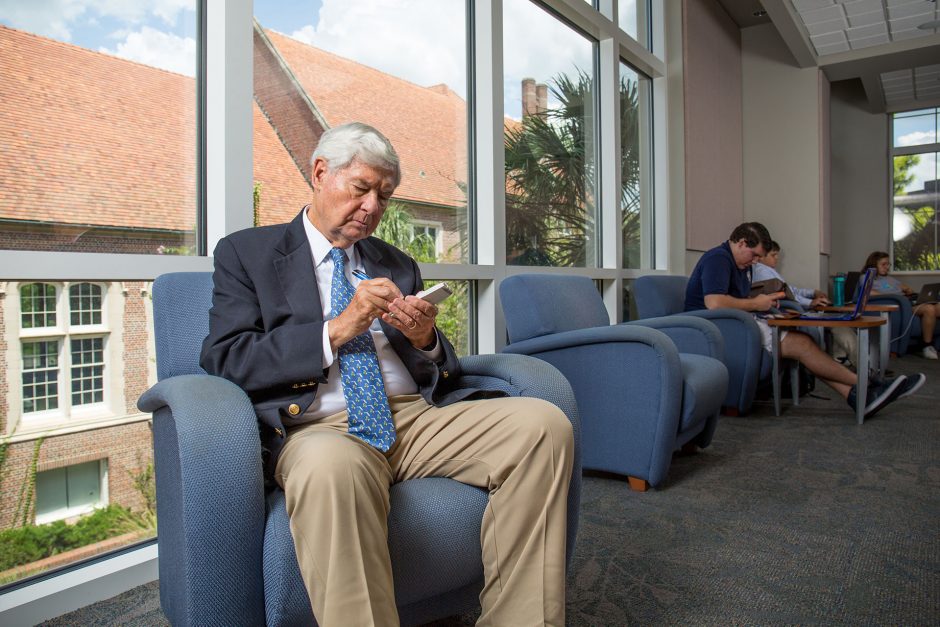
Sen. Bob Graham, shown here in September 2017, makes a point to visit with faculty, staff, and students at his eponymous center as often as he can. Lyon Duong / UF Photography
While Graham went on to an illustrious career in politics, Pugh, a building construction major, became a nationally recognized developer. Pugh is considered one of the nation’s most prominent homebuilders, and his real estate development firm, Epoch Properties, is annually ranked as one of the top multifamily housing developers in the U.S. Fittingly, the building that bears his name is an architectural focal point in the historic district of the UF campus.
“Bob Graham and I have been friends for 60 years,” Pugh says. “Alexis and I have carefully followed his career and witnessed his extraordinary leadership and character. He’s the real deal.”
Pugh always wanted to find a way to give back to his alma mater, and he and his wife were exploring philanthropic opportunities at UF when they learned that Graham was planning to establish a public service center at UF.
“Bob was convinced that the center would enrich the lives of students and provide valuable civic engagement opportunities,” says Pugh. “My wife and I were looking for an appropriate financial contribution to our beloved university, so the connection of donor support to the university and a place to house the Graham Center was a natural fit.”
A Legacy of Leadership
2016 was a milestone year for both Graham and his eponymous center. The center celebrated 10 years on the UF campus, and Graham celebrated his 80th birthday. While the center will surely be part of Graham’s lasting legacy of leadership and service to the state of Florida, Graham himself dismisses the idea of legacy building.
“I don’t believe in shaping your own legacy. That is the work of historians. You do what you think is right and important and hope that the benefits of your actions stand up to scrutiny over time,” Graham says. “I believe it is important for college-aged young people to gain a deeper understanding of what it means to be a citizen in our democracy.”
In Graham’s view, providing students with an understanding of their rights and responsibilities and arming them with the skills needed to operate effectively as citizens is the best antidote for the decline in civic engagement.
“If the beginning of the 21st century has shown us anything, it is that our democracy is under assault,” he says. “This assault is evidenced by the decline in citizen involvement in public affairs, lack of participation in community problem solving, and a waning in voter turnout among our country’s youngest voters.”
Graham believes the center has a role to play — not only in changing this disturbing trend but also in fostering civil discourse and encouraging other universities to follow suit.
“The increasingly partisan and polarized political climate has frustrated the ability of our democracy to create policies that benefit all citizens,” Graham says. “The center hopes to stand as a source of enlightenment and as a beacon for other institutions to do the same.”
What’s next for the Graham Center? Colburn says an expansion of internships and undergraduate research opportunities. Greater faculty engagement and an elevation of the center’s statewide and national presence also are on the horizon.
“Establishing an endowment to underwrite the center’s programs will be essential,” says Colburn. “The center fosters the intellectual enrichment and public engagement of our students. We want them to prosper professionally, but we also want them to give back to their communities. They will be the better for it, and so will we.”
As for Graham, he will continue to tout his message of engaged and informed citizenship and champion issues of importance to Florida and the nation.
In October, Graham was recognized by the UF College of Liberal Arts and Sciences for his continued contribution to the state and the university. During the college’s Evening of Excellence, Dean David Richardson presented Graham with the inaugural Civic Champion Award. “Of our many alumni who commit their lives to public service, the first person who comes to mind is Sen. Bob Graham,” Richardson said at the ceremony. “Bob Graham is the epitome of what it means to be a Civic Champion.”
Graham remains a civic champion. Throughout his public service career, he has advocated for better schools, economic opportunity for all citizens, government transparency, the preservation of natural resources, and a strong, participatory democracy. He has represented the nation and UF with distinction, honor, and integrity. The Graham Center will ensure that legacy by nurturing the next generation of state and national leaders.
